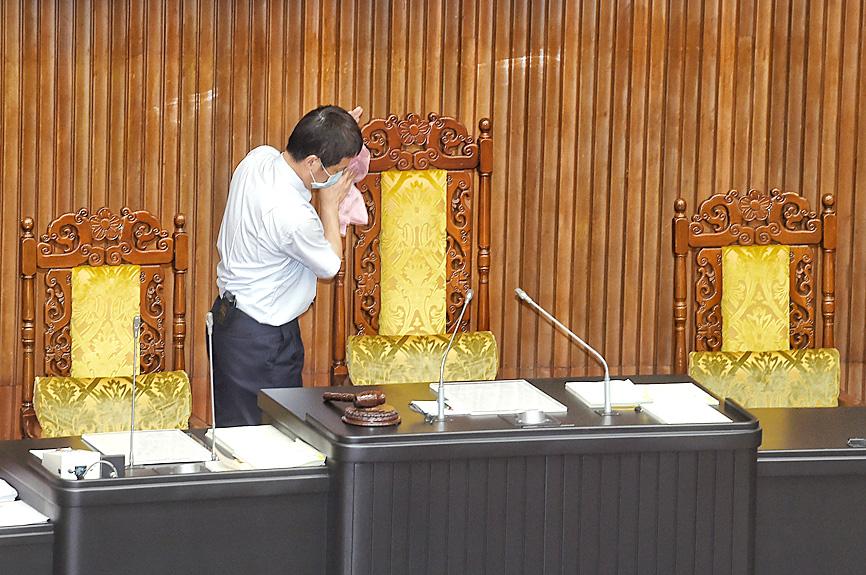Legislators on Friday passed revisions to the Urban Renewal Act (都市更新條例) to encourage the reconstruction of aging buildings by offering incentives and streamlining procedures.
Amendments to articles 57, 61 and 65 of the act were proposed by the Cabinet in December last year to address buildings that do not meet earthquake resistance standards introduced after the deadly 921 Earthquake that hit central Taiwan on Sept. 21, 1999, the Ministry of the Interior said in a statement.
There are more than 36,200 such buildings with six or more floors built before the regulations went into effect in December 1999, the ministry said.

Photo: Fang Pin-chao, Taipei Times
The revisions also address properties built with sea sand, which contains higher levels of chloride ions, which accelerates the corrosion of rebar and undermines the safety of a building, it said.
The amendments would help resolve issues with urban renewal projects for apartment buildings that have already been approved to be razed, but some owners of units in the buildings refuse to allow the building to be demolished.
Before the changes, the local government could step in, but it must then negotiate with the holdouts before any steps could be taken, which could be a long and cumbersome process.
Under the revisions, if a building is deemed a threat to public safety because it does not meet earthquake standards or was built with sea sand, local authorities could bypass negotiations and raze a building with the support of a majority of the owners of a building’s units.
The amendments do not specify the size of a majority needed to bypass negotiations.
Local governments would have the authority to identify unsafe properties built with sea sand, because they have the experience to deal with the issue, the ministry said.
The ministry would consult experts and academics to establish regulations on how to classify a building as unsafe when it does not meet the existing earthquake resistance requirements, it said.
Another revision provides an incentive to owners of units in substandard or unsafe buildings to rebuild, by increasing the maximum floor area allowed for any new construction.
Under existing rules, the floor area ratio — the ratio of a building’s total floor area to the size of the plot of land on which it is built — allowed for urban renewal projects is 120 percent.
The revised law increases that to 130 percent. The additional space is usually sold to outside customers to defray or pay for rebuilding costs.
Lawmakers also passed a resolution that urged the government to ensure that people’s right to adequate housing under international conventions is protected when applying the new amendments.

An essay competition jointly organized by a local writing society and a publisher affiliated with the Chinese Communist Party (CCP) might have contravened the Act Governing Relations Between the People of the Taiwan Area and the Mainland Area (臺灣地區與大陸地區人民關係條例), the Mainland Affairs Council (MAC) said on Thursday. “In this case, the partner organization is clearly an agency under the CCP’s Fujian Provincial Committee,” MAC Deputy Minister and spokesperson Liang Wen-chieh (梁文傑) said at a news briefing in Taipei. “It also involves bringing Taiwanese students to China with all-expenses-paid arrangements to attend award ceremonies and camps,” Liang said. Those two “characteristics” are typically sufficient

A magnitude 5.9 earthquake that struck about 33km off the coast of Hualien City was the "main shock" in a series of quakes in the area, with aftershocks expected over the next three days, the Central Weather Administration (CWA) said yesterday. Prior to the magnitude 5.9 quake shaking most of Taiwan at 6:53pm yesterday, six other earthquakes stronger than a magnitude of 4, starting with a magnitude 5.5 quake at 6:09pm, occurred in the area. CWA Seismological Center Director Wu Chien-fu (吳健富) confirmed that the quakes were all part of the same series and that the magnitude 5.5 temblor was

The brilliant blue waters, thick foliage and bucolic atmosphere on this seemingly idyllic archipelago deep in the Pacific Ocean belie the key role it now plays in a titanic geopolitical struggle. Palau is again on the front line as China, and the US and its allies prepare their forces in an intensifying contest for control over the Asia-Pacific region. The democratic nation of just 17,000 people hosts US-controlled airstrips and soon-to-be-completed radar installations that the US military describes as “critical” to monitoring vast swathes of water and airspace. It is also a key piece of the second island chain, a string of

The Central Weather Administration has issued a heat alert for southeastern Taiwan, warning of temperatures as high as 36°C today, while alerting some coastal areas of strong winds later in the day. Kaohsiung’s Neimen District (內門) and Pingtung County’s Neipu Township (內埔) are under an orange heat alert, which warns of temperatures as high as 36°C for three consecutive days, the CWA said, citing southwest winds. The heat would also extend to Tainan’s Nansi (楠西) and Yujing (玉井) districts, as well as Pingtung’s Gaoshu (高樹), Yanpu (鹽埔) and Majia (瑪家) townships, it said, forecasting highs of up to 36°C in those areas